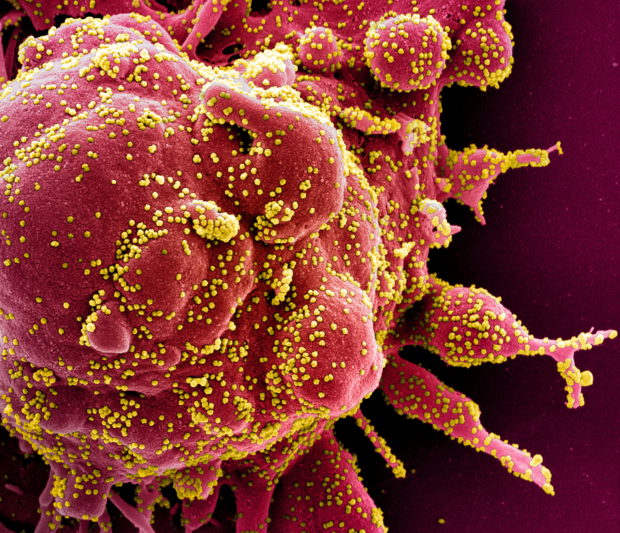
FILE PHOTO: Colorized scanning electron micrograph of an apoptotic cell (red) infected with SARS-COV-2 virus particles (yellow), also known as novel coronavirus, isolated from a patient sample. Image captured at the NIAID Integrated Research Facility (IRF) in Fort Detrick, Maryland. National Institute of Allergy and Infectious Diseases, NIH/Handout via REUTERS.
MANILA, Philippines — The Philippines may need to “reimmunize” the public every time there is a concerning variant of the SARS-CoV-2 virus that causes COVID-19, a vaccine expert said Tuesday.
Dr. Mario Jiz, head of the Immunology Department at the Research Institute for Tropical Medicine and a member of the country’s Vaccine Expert Panel (VEP), noted that the current vaccines we have are those developed against the original SARS-CoV-2 variant that was discovered in Wuhan, China in late 2019.
“What we have seen in these circulating human coronaviruses is that pwede tayong magkasipon ulit after one year or so kasi bumababa ang ating immunity to that, so if ganoon ang pattern ng ating COVID, then it seems like there is a possibility na magwe-wane ang ating immune response maybe after a year, a year and a half, and that may be the efficacy period of our vaccines,” he said in a media forum hosted by the Department of Health.
(What we have seen in these circulating human coronaviruses is that we can get colds again after one year or so because our level of immunity decreases, so if that is the pattern of COVID, it seems our immune response may wane maybe after a year or a year and half, and that may be the efficacy period of our vaccines.)
“Parang sa flu din, potentially baka magkaroon tayo ng variant-specific na immunizations every now and then. Huwag naman sana every year, but every time that there is a concerning mutation or concerning variant that comes in, we may have to reimmunize or reboost our population,” he added.
(Same with flu, we may have variant-specific immunizations every now and then. I hope it will not be yearly, but every time there is a concerning mutation or variant, we may have to reimmunize or reboost our population.)
Jiz said experts have to make sure that vaccines are still effective in the new variants that are arising.
“So kunwari may dumating na variant after six months or one year, we have to check that if the vaccines are working or not, and ang unang tinetest dyan would be the antibodies. Most probably kapag marami ang mutations ng variant na ‘yun, most probably, most of our vaccines will fail kasi nga, remember ang mga vaccines natin ngayon are actually based on the original China strain,” he further said.
(So for example if there is a new variant that comes after six months or one year, we have to check if the vaccines are working or not, and the first to be tested is the antibodies. If that variant has many mutations, most probably most of our vaccines will fail, because the vaccines we have are based on the original China strain.)
“So kapag sobrang dumami na talaga ang mutation ng ating virus, baka kasi mag-escape na siya, ‘yung tinatawag nating immune escape, so first we have to assess that in the laboratory and see if the serum or antibodies from our vaccinated individuals will still work or no longer work,” he explained.
(So if the mutations become many, it may lead to immune escape, so first we have to assess that in the laboratory and see if the serum or antibodies from vaccinated individuals will still work or no longer work.)
Nevertheless, Jiz pointed out that T-cells from common cold coronaviruses can provide protection against COVID-19. The “T” stands for thymus, the organ in which the final stage of cells’ development occurs.
“There’s also the T-cell response, and most probably the T-cell response will still work kasi nga (because) the virus in itself can only mutate so much,” said Jiz.
“So we are banking on our T-cells to prevent us from severe COVID infection, so for us na healthy, walang comorbidities, relatively young, less than 60 or 70 years old, I guess for now, getting these boosters and primary series of vaccination will be sufficient kahit pa may dumating na variants of concern as long as hindi sobra-sobra talaga ang mutations niya,” he added.
(So we are banking on our T-cells to prevent us from severe COVID infections. So for those who are healthy, do not have comorbidity and are relatively young, I guess these boosters and primary vaccination series would be sufficient for now as long as the variant does not have too many mutations.)
However, he said that those with comorbidities and the elderly may need to get additional jabs.
“We may have special populations that may need additional doses such as those that are immunocompromised or the elderly. Kailangan natin tutukan ang (We need to focus on our) parents and grandparents kasi (because) they will need help in their immune responses, so those probably are the special populations that we will need to boost whenever there is a new variant,” the immunologist said.

